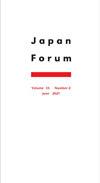Matthew M Carlson and Steven R Reed, Political Corruption and Scandals in Japan
IF 0.2
Q2 AREA STUDIES
引用次数: 0
Abstract
PM Abe Shinzo’s final year as PM was accompanied by opposition party criticism for his alleged use of taxpayers’ money to reward his supporters at cherry blossom viewing parties. At around the same time two of his cabinet colleagues were forced to resign amid allegations of having breached election campaign regulations. In the case which involved the husband and wife politicians Katsuyuki and Anri Kawaii, this led to the prosecution of Katsuyuki on vote buying charges, a verdict of guilty and a fine of ¥1.3M. Later, three years in prison was handed down in June 2021. The reporting of these scandals in the media gives the impression that little has changed since the 1970s when reports of the corrupt practices engaged in and inspired by Tanaka Kakuei made it appear to be an integral if unacceptable dimension of political activity in Japan. Carlson and Reed show this conclusion to be unfounded. Their analysis of the combined impact of a series of measures both great and small mainly dating from the 1990s draws them to the ‘optimistic conclusions’ that political reforms have been effective in reducing the incidence of political corruption even if the transparency that has allowed this to happen has had the paradoxical and unintended consequence of making the voting public more aware of that which continues to exist. They present an excellent political science case study that steers clear of statistical data derived from an operational definition of corruption in favour of a conceptual definition of the problem. Rather than marshal statistics of the percentage of citizens who paid bribes or police statistics on election law violations, their research began by looking for ‘anything that seemed to pervert the democratic process’ (p 160). Had they adopted the former approach they admit they would have missed much of the story. Moreover, they would not have been able to reach their two central findings:马修·卡尔森和史蒂文·R·里德,《日本的政治腐败和丑闻》
日本首相安倍晋三在任的最后一年受到了反对党的批评,因为他涉嫌在赏樱派对上使用纳税人的钱来奖励支持者。几乎在同一时间,他的两名内阁同事因违反竞选条例的指控而被迫辞职。在涉及政客夫妇川井胜之(Katsuyuki)和川井安利(Anri Kawaii)的案件中,这导致了对川井胜之(Katsuyuki)贿选指控的起诉、有罪判决和130万日元的罚款。后来,在2021年6月,他被判处三年监禁。媒体对这些丑闻的报道给人的印象是,自20世纪70年代以来,田中角荣参与和激发的腐败行为的报道几乎没有改变,这似乎是日本政治活动中不可分割的一个方面,尽管这是不可接受的。卡尔森和里德认为这个结论是没有根据的。他们对主要从上世纪90年代开始的一系列大大小小的措施的综合影响进行了分析,得出了一个“乐观的结论”,即政治改革在减少政治腐败的发生率方面是有效的,即使允许这种情况发生的透明度产生了自相矛盾的意想不到的后果,即让投票的公众更加意识到继续存在的问题。他们提供了一个优秀的政治学案例研究,避开了从腐败的操作定义中获得的统计数据,而倾向于对问题的概念定义。他们的研究开始于寻找“任何似乎扭曲民主进程的东西”,而不是收集行贿公民比例的统计数据或违反选举法的警方统计数据(第160页)。他们承认,如果采用前一种方法,他们就会错过很多故事。此外,他们也无法得出两个主要结论:
本文章由计算机程序翻译,如有差异,请以英文原文为准。
求助全文
约1分钟内获得全文
求助全文

 求助内容:
求助内容: 应助结果提醒方式:
应助结果提醒方式:


